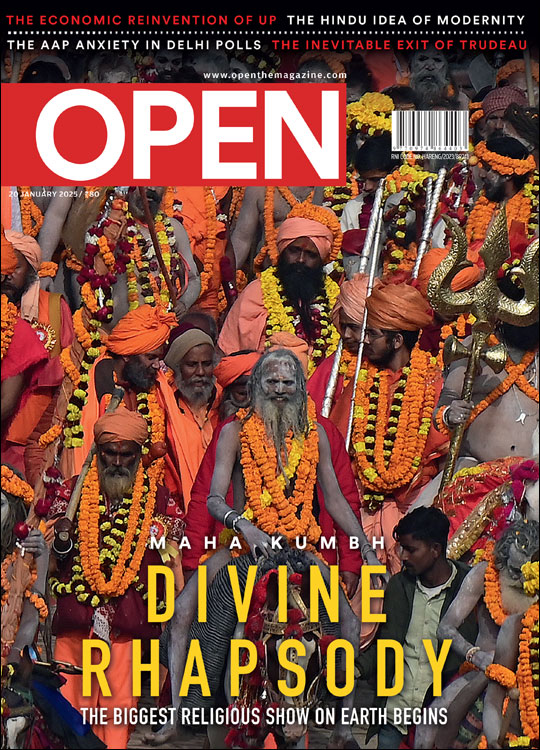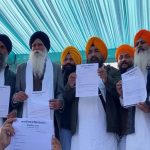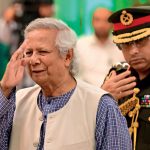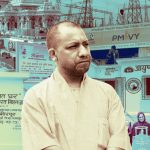A Report From the Haunted House of Indian Marxists
The 22nd Party Congress of CPM was long on rhetoric and short on realism
/wp-content/uploads/2018/04/CPM1.jpg)
SPEAKING TO DELEGATES in Hyderabad on the fourth day of the six-day 22nd Party Congress of the Communist Party of India (Marxist), its triennial summit, General Secretary Sitaram Yechury poked fun at what he called the ‘bourgeois media’ for their distorted portrayal of communists. He specifically named the Malayala Manorama, a Kerala daily, for carrying allegedly biased news on comrades. This newspaper had carried a photograph taken at the inaugural session of the Party Congress in which senior Politburo member S Ramachandran Pillai—who is from the rival Prakash Karat camp and was a contender to the top post in the previous Party Congress in Visakhapatanam—appears to be checking out Yechury’s green-coloured delegate badge. Its caption had employed a Malayalam usage associated with the colour (‘Pachcha pidikkumo?’) which can be loosely translated as ‘will he strike gold?’
In his speech, Yechury said he felt that it was an effort to make it look as if there was a wedge between Pillai and him. The 81-year-old Pillai, the 66-year-old general secretary said, was actually cautioning him over having misplaced the special badge with his name. He had handed over the bag with it to a volunteer at the Hyderabad conclave’s flag-hoisting ceremony, and later when he failed to spot him, he simply picked up another one meant for volunteers.
That there had been dissension within the CPM was not glossed over, though. A delegate from Kerala, K Chandran Pillai, for example, highlighted the collateral damage caused by internal feuds during a discussion on the ‘draft political organisational report’. His speech focused on deliberate “leaks” from high-level bodies such as the Politburo and Central Committee to so-called “bourgeois” media groups. G Mamatha, a delegate from the party’s Central Committee office, also expressed concern about some leaders leaking information to select media groups in order to undermine their rivals.
While it is true that warring sides have plied a few journalists with information that suited their political stance, Yechury’s mention of the Malayala Manorama evoked laughter among a large section of delegates. “It is public knowledge that Comrade Yechury maintains thick ties with the so-called ‘bourgeois media’, especially in Delhi, and therefore despite all his wisecracks about distortions and biased coverage, the joke was really on Sita [short for Sitaram],” says a delegate from Delhi.
When it comes to the CPM, however, there is more than enough material for humour. Many quotations of Bolsheviks and East European Marxists and their Indian counterparts of yore lend themselves to quips on how out of touch communists are with the country. And as they stare at a crisis of survival in India, the jokes only get grimmer for them. Many of the outbursts of Marxist leaders underline the incongruity of their existence and their marginalisation as a political force in the circumstances that prevail.
Both Yechury and his predecessor Prakash Karat called the deliberations at the conclave unique, arguing that five-day-long discussions over ‘ideological differences’ offer evidence of the democratic credentials of their party, where, unlike in others, it is not two or three people who take important decisions. Indeed, there is truth in that statement: the political resolution was presented by Karat and a minority view of the Central Committee by Yechury. The last time a minority view was placed at the Party Congress was when the late founder-general secretary P Sundarayya proposed his at the Jalandhar Party Congress in 1978. What precipitated matters this time was that Yechury and his supporters, who advocate an ‘understanding’ with the Congress, were a smaller group in the Politburo and Central Committee. Over the span of a year, three “full-fledged” sittings of the former and two of the latter had discussed the issue threadbare. Yechury favoured a united front against the BJP, but his proposal was rejected by a 55-31 vote at the Central Committee level. Refusing to give up, he pressed for it to be taken up at the far-wider Party Congress with hundreds of CPM delegates (over 800 including central panel members), aware that it would serve as a test of his own leadership.
Ahead of the Hyderabad reckoning, in a neat ruse, Yechury diluted his position of a give-and-take arrangement with the Congress to suggest that the CPM, while ruling out an electoral alliance with it, shouldn’t slam its doors on an ‘understanding’ with secular parties at a time when Hindutva forces are on the rise. His plea was for an amendment of the CPM’s political resolution that it can have no ‘understanding’ with the Congress.
The gathering in Hyderabad spent five days, starting before 10 am and parleying until 8 pm (and often later), over the question of whether to retain or delete that word. Some delegates gave vent to their frustrations and launched into personal attacks, not sparing anyone, not even Yechury, Karat and Kerala Chief Minister Pinarayi Vijayan (who is also a Politburo member). While a few speakers charged Yechury with trying to get back at the party for denying him a Rajya Sabha seat the third time, VJK Nair from Karnataka, speaking in favour of the general secretary, ridiculed Vijayan saying that his much-celebrated road show in Mangalore would have been a flop if the state’s Congress government hadn’t helped out with arrangements. Kerala’s KK Ragesh, a Rajya Sabha member, made comments about the general secretary’s vaulting political ambitions as the motive of his outreach to other parties. Yechury later said that he didn’t wish to join issue with people who make such below-the-belt remarks.
A close scrutiny of the draft political resolution and the one that was finally adopted reveals hardly any difference between them. So, was the brouhaha over semantics rather than politics? The word ‘understanding’ was excised from Section 2.115 (ii) of the political resolution to state that the party can join hands with secular democratic forces ‘without having a political alliance with the Congress party’.
While Karat had to present the entire resolution in Hyderabad, Yechury had the option of focusing on that single word under dispute, and his speech gave the impression that there was a wide gap between his stance and that of Karat—with the result that a large section of the media fell hook, line and sinker for it.
Sitaram Yechury’s plea at the 22nd party Congress was for an amendment of the CPM’s draft political resolution which ruled out any ‘understanding’ with the Congress
Section 2.89 of the draft resolution had stated that ‘…it is the BJP which is in power today and given its basic link to the RSS, it is the main threat. So, there cannot be a line of treating both the BJP and the Congress as equal dangers’. Then what prompted Yechury to claim that his minority view was more practical in suggesting a distinction between the Congress and the BJP?
The draft resolution (2.90) also stated: ‘[The CPM’s] tactical approach should be to cooperate with the Congress and other secular opposition parties in Parliament on agreed issues. Outside Parliament, we should cooperate with all secular opposition forces for a broad mobilisation of people against the communal threat. We should foster joint actions of class and mass organisations, in such a manner that can draw in the masses following the Congress other bourgeois parties.’
Clearly, there is nothing about ‘doors being closed’ to the Congress and other so-called secular parties in the official draft resolution.
Several delegates that Open spoke to were carried away by quibbles over a point of linguistics, even as the summit failed to discuss any other pressing matter, be it inflation, atrocities on Dalits, the agrarian crisis, sluggish job scenario and ways to forge mass and class struggles to revive a Left in decline. “If a high- level meet discussed an amendment that was purely incremental by nature and sidestepped everything else, then it is just babble all the way and does not outline action plans,” says a delegate from Himachal Pradesh.
Yechury came under criticism from Rakesh Singha, the lone CPM MLA from Himachal Pradesh, for attempting to divide the party by clinging on to a “meaningless” debate. The CPM leader made an emotional speech lashing out at Yechury for ‘sabotaging’ the political resolution that the party had adopted in Visakhapatnam. Singha also wanted to know who gave the general secretary the right to hurt the party’s interests. He was referring to the 2016 West Bengal election in which the CPM struck an electoral pact with the Congress to take on the ruling Mamata Banerjee-led Trinamool Congress in the state. The outcome was humiliation for the party. Though Yechury loyalists like Mohammed Salim, a CPM Politburo member, had bragged of achieving a thumping victory for the alliance, the CPM found its seat tally in the state’s 294-member Assembly halved to 28 from five years earlier, with its vote share crashing by double digits; the Congress, thanks to the tie-up, added 3 per cent to its vote share and got two seats more than in the previous election, winning 44. It was clear that the Congress didn’t reciprocate the CPM’s gesture of transferring its committed votes to the ally.
And yet, at the Party Congress, Yechury focused on the threat of the BJP with no mention of his disastrous alignment with the Congress in West Bengal. In a speech replete with bombastic terms such as ‘neo-liberalism’, ‘class enemy’, ‘class struggle’, ‘fascism’ and quotes from Mao and others, Yechury alleged that Narendra Modi had ushered in authoritarianism and that there were signs of an India headed for fascist rule.
Yechury, presenting the ‘minority view’, spoke of a “qualitative change” in what he called the “authoritarian tendencies” of the Modi Government. He coined a word, ‘accrusion’—perhaps a combination of ‘accrual’ and ‘accretion’—to argue that India was witnessing not just an “intensifying of quantitative accrusion of these tendencies”, but also changes that would veer the country towards the setting up of a fascist regime. The audio clip of his closed-door speech, available with Open, also seems to hint that his rivals within aren’t as concerned about the BJP’s ascendance as he is.
Yechury said that he had no disagreement with the political resolution proposed by the majority, other than where it was stated that the CPM should forge ahead ‘without any understanding or an electoral alliance with the Congress’. What he wanted was the latter ‘f’ added before ‘or’, to make it, ‘…without any understanding for an electoral alliance with the Congress’ (emphasis Open’s).
HAVING RUN A campaign that led observers to believe the CPM was headed for a division over the party’s approach to the Congress, the Yechury camp at Hyderabad won a triumph of sorts in terms of popular perception. “The fact that Yechury and his team walked away with impunity after violating all party norms in West Bengal in an unsuccessful bid is forgotten,” says a Politburo member from Kerala, “Equally oblivious is the media to what the equations between the CPM and the Congress are on the ground. The Congress invariably wants CPM votes in states where the latter isn’t formidable but has pockets of influence. There has never been a quid pro quo that also benefited the CPM. One should not have any illusion. Just saying that is not enough; one must analyse the situation carefully.” The Congress, which recently approached the CPM for its votes in southern Karnataka, turned down a strategic understanding with it; the party wanted CPM votes for nothing in exchange.
One speaker argued that Pinarayi Vijayan’s much-celebrated road show in Mangalore would have been a flop if Karnataka’s Congress government hadn’t helped out with arrangements
Regardless, much of the media portrayed Hyderabad as ‘advantage Yechury’. That his ‘f’ suggestion—offered behind closed doors— was on WhatsApp chats among journalists of the ‘bourgeois’ media made it apparent to delegates who was linked with who.
To give him his due, Yechury’s speech did hold appeal for a gathering that grew up on texts filled with anti-capitalist rhetoric. Besides, he is affable and charismatic. He argued that the party couldn’t afford to fight only those who push neo-liberal policies in the country, and that too in isolation. He advocated an integrated approach to fight neo-liberalists; those who peddle Hindutva politics; undermine institutions and hijack constitutional bodies; and drag India into becoming a junior partner of the US for the project of American “imperialism”.
All these are interlinked in the changing world of Indian politics, he said, emphasising that the implementation of GST and demonetisation were in line with efforts to maximise profits for international capital. “They are not delinked. The argument that neo-liberal economic policies [should] get primacy” (in the CPM’s struggle) was not correct, he said. Yechury, in his animated speech, said the struggle against neo-liberal policies is disrupted by the sharpening of communal polarisation that divides the “working classes and poor peasants”.
Invoking Lenin may no longer work among Leftists in Europe, but in India, it apparently still does. Yechury used Lenin’s aphorism ‘concrete analysis of concrete situations’ to caution his comrades thus: “If according to these [new] circumstances if our analyses don’t change, then we are not being true Marxists.”
Much of his speech sounded like a guided tour through Marxist textbooks: “All these happenings—the control over state power, this dehumanisation of society…—are an attack on the social consciousness of the people, and that is the biggest barrier for the development of progressive thought and consciousness among the people. Because of these developments, Marxism and progressive ideologies cannot reach the people. Why is this happening? Because there is an assault on reason. The assault on reason is the triumph of unreason over reason. It is the triumph of irrationality over rationality.”
Comparing current-day India with pre-Nazi Germany, it would seem, does not sound corny in such communist quarters, but then comrades are known to engage in tireless debates that others sometimes describe as ‘Afghanistanism’. After charging the Government with using the courts to free its criminals, Yechury waxed rhetorical on the rightist turn of the great Germans: “…the inheritors of the most progressive philosophies, of Hegel and others, of dialectics, how did these people reared in those traditions accept the ideology of fascism?”
To embellish his delivery, Yechury called upon the usual suspects. He suggested Georg Lucas’ The Destruction of Reason as a must-read for all delegates to understand the growth of fascism. He railed against efforts to convert history into mythology and the syncretic traditions of Indian philosophy into Hindu theology, arguing that this attack on reason was “numbing the consciousness” of the Indian people. “If we do not resist this, then the growth and acceptance of progressive ideas will become much more difficult, and if this has to be done, it is imperative that [the BJP-RSS combine’s] control over state power should be removed at the earliest, so that these sort of attacks cannot continue,” he said.
With Lucas held up, could Dimitrov be far behind? Yechury paraphrased the Bulgarian communist Georgi Dimitrov to suggest that fascism doesn’t happen overnight and that it comes into effect over a long period of time. In the 1930s, Dimitrov had come up with the idea of a ‘popular front’, an anti-fascist coalition that he envisaged would go beyond working-class groups and draw centrists and social democrats into its fold.
To round up his argument, Yechury made this final case against the regime: “Without [dislodging the BJP Government], we cannot advance our own class struggle,” he said, adding that “the question is, do we isolate ourselves further or do we help in accelerating the process?” He also said that there are lessons on coalition tactics to be learnt from the Russian, Vietnamese and Chinese revolutions. Mao divided China’s landlords when Japan attacked and won some over, he said, asking if anyone had ever called him a betrayer of the revolution. Alongside all this posturing, there has been a murmuring campaign of sorts in the social media and outside that whoever underestimated the potential of ‘fascist’ forces was in a denial mode like Marxist scholar Kaul Kautsky (whom Lenin had rebuked in his work, The Proletarian Revolution and the Renegade Kautsky). In the late 1920s, Kautsky had argued that fascism that was gaining in momentum in Italy was unlikely to spread elsewhere, especially in Germany. Even after Hitler’s rise as Chancellor in 1933, he displayed great optimism that “Fascism will not cross the Rhine, let alone the North Sea”. In his response to the delegates, some of whom had suggested that “fascism was at the gates” in India, Karat said, he for one, didn’t agree with the assertions that the current ruling regime is fascist though it is controlled by the RSS, which he said is fascist. He agreed that fascistic tendencies have emerged but the party leadership has not yet agreed on the ruling BJP government being “fascist”. Said Karat: “There are still differing assessments about the nature of the Modi regime … There are comrades who say fascism (has come to being). I, for one, would see this tactical line as wrong in the present situation … The central committee has not come into this understanding (that fascistic forces are already in power).”
After all those heavy words at the conclave, what offered relief was a look at the fine-print of the CPM’s documents. Through an amendment prior to the Party Congress, for example, a reference to ‘North Korea’ was changed to ‘DPRK’, perhaps a trick to avert having to mention a country that is seen as a global pariah. Though communist parties in many other countries have distanced themselves from North Korea over its dynastic politics and autocratic rule, apart from other excesses, the CPM seems to be in no mood to berate it. ‘The CPM expresses its solidarity with the socialist countries of China, Vietnam, DPRK, Cuba and Laos and fully supports the efforts to strengthen socialism in their respective countries,’ states its resolution. Further, it says, ‘Over half a century of sanctions imposed against the DPRK have deprived the country of trading its rich mineral resources in return for food and other necessities for its people. Under these circumstances, in order to defend itself from the present threat from the US-South Korea military axis, the DPRK has been spending huge resources to strengthen its defence preparedness.’
While the CPM prides itself for its inner-party democracy, its rejection of some amendment proposals reveals another side. One suggestion was that ‘the politburo and general secretary so elected shall be ratified by the Party Congress in a secret ballot. (The) unratified comrade can continue as (a) central committee member, but for the politburo and general secretary alternative names shall be proposed which shall be ratified by the Congress by secret vote’. This was rejected; ‘There is no need to change the present system,’ in the party’s view. An amendment for reducing the maximum terms allowed to a general secretary from three to two was also turned down.
Despite VS Achuthanandan, 95, the oldest CPM delegate, submitting an amendment apparently in favour of Yechury, the Kerala unit backed Prakash Karat
However, the party was more flexible with others. One proposal was to delete a line from the Constitution that says, ‘If the resignation (of a party member) is on political grounds the unit may refuse to accept the resignation and may expel him.’ This came from some Tamil Nadu members of the party. It was not accepted, but the reply of the party brass was: ‘Assessing the circumstances, the party unit can take appropriate action either to accept the resignation or to expel the party member.’ Meanwhile, an amendment that proposed a plan for a three-tier organisational system to attract young people to the party fold was also turfed out. The suggestion was for councils at the national, state and district levels, besides central, state and district committees and secretaries. The party’s stand: ‘The time-tested organisational structure of the party need not be changed.’
Beyond all the ado about nothing, several delegates say the Party Congress lost its focus this time round because it wasted time on whether or not to tweak a word or replace it. “The party now faces numerous hurdles. If in the 2021 polls, the CPM in Kerala loses thanks to its rotational politics [the election of the Congress and CPM alternately], the Left will have no presence in the country anymore. We should have focused more on discussing how to organise farmer protests like the ones that nobody could ignore in Maharashtra and also in Rajasthan, so that we become force multipliers in other states that are not traditional strongholds. We should have also spent more time on how to strengthen the party’s position in Kerala, Tripura and West Bengal. We are actually in dire straits now. There is no time to waste on one word or the other,” says a leader from Kolkata. He also disapproves of how Karat and Yechury traded barbs at the plenary without naming each other. To this leader’s mind, no less unbecoming was a press conference held by Politburo member Brinda Karat saying that the minority view wasn’t accepted at the Party Congress. On the fifth day of the gathering, hours after she addressed the media and played down perceptions of Yechury’s view having won, the latter’s right-hand man and Politburo colleague Mohammed Salim turned up at Sundarayya Vignana Kendra in Hyderabad (where Brinda Karat had addressed the media) to counter her statements, but he made it a point to add that the top leadership had shown resilience in handling the quarrel.
“When sophisticated comrades fight, they call it an ‘ideological difference’,” a Kerala leader tells me in part regret and part jest, “In Kerala, even a difference of opinion is viewed as factionalism. There seems to be elitism at work here.” Notably, Telangana CPM strongman and state secretary Tammineni Veerabhadram, who has successfully forged an alliance with progressive parties and various other groups in the state to fight the 2019 assembly polls, is known to have strongly disapproved of Yechury’s efforts to tilt towards the Congress. Veerabhadram has let his action speak louder than words. His state unit has aligned with as many anti-BJP groups as possible ahead of the polls in 2019. The new alliance of 28 organisations, cobbled together in January, is titled Bahujan Left Front (BLF). The opposition to Yechury’s proposals from the likes of him is perhaps proof that the idea of the formation of a united front against the BJP with help from the Congress is far removed from reality. “Why bat for the Congress before we look for options like the BLF,” asks a delegate from Telangana.
Despite VS Achuthanandan, the oldest delegate (aged 95), submitting an amendment apparently in favour of Yechury, the state unit backed Karat at the behest of Vijayan. No participant in the deliberations from Kerala was in open favour of Yechury, though a secret ballot may have seen some leaders switching sides. Samik Lahiri from West Bengal, who took part in the debate on the political resolution, wonders why there wasn’t a variety of views expressed by delegates from “big states”, hinting at Kerala as one such. Yechury asked a few Kerala delegates in good humour whether they had been issued a “whip” not to vote in his favour if the “ideological” divergence led to a vote. In the event, senior leaders, unsure of what a secret poll on the matter might throw up, opted to yield to Yechury’s demand.
There are those who argue that Yechury would have lost an anonymously polled referendum. Anyhow, it was the dithering Karat camp that finally decided that a vote would hurt party unity, which it could ill afford under the political circumstances. Its Lok Sabha strength has fallen from 43 seats in 2004 to nine now. The party has lost its two strongholds over the past seven years. Karat’s detractors hold him responsible for this drastic slide and accuse him of mishandling the party’s affairs when he was its chief; they argue that in West Bengal, it was his dogmatic stance that forced the Congress to play ball with the Trinamool Congress, finally resulting in a major loss for the Left.
Prabir Purkayastha, a political commentator, feels that unless the CPM works hard to expand its influence through mass and class mobilisations, its future in India looks bleak. Notably, the party has seen falling recruitments from farmer groups and trade unions over the past few decades, with most new members having joined the CPM through its student wing. Even so, the younger generation doesn’t seem to connect with the party’s programmes, which, most delegates Open spoke to agree have failed to strike a chord with citizens under forty, whose aspirations the party appears unable to address. The leadership on the dais and composition of the steering committee of the Party Congress spoke volumes about the dominance of ageing politicians. Against expectations, the CPM decided to retain Pillai, who is past 80, in its Politburo. Besides, the CPM’s appeal among those who have come out of poverty and are aspiring for greater things in life is seen as abysmal. This was apparently one of the reasons for the resounding setback in Tripura where the party continued to focus on the poor alone.
Another sign of the CPM’s anachronistic existence lies in the way its credentials committee report at the Party Congress is framed. According to the document, of the 758 delegates surveyed, eight are of bourgeois ‘class origin’, compared with 14 three years ago; delegates of petit bourgeois origin are three, compared with six at the 2015 conclave. This, according to The Concise Oxford Dictionary of Politics, is a term used by Marx to describe an intermediate class between the proletariat and the bourgeoisie. Within this category, the ideologue included artisans, shopkeepers and better-off farmers. Other classifications in the report—as old as Lenin—refer to the working class, poor peasant, middle peasant, rich peasant, agricultural labourer and so on. The Marxist scholar Perry Anderson has stated in the ‘Enlarged Edition’ of his work, The Indian Ideology, that though he hasn’t been able to tackle in depth the marginalisation of the Left in India, ‘where religion fuses with the nation in any independence struggle and ensuing construction of a post-colonial state, the Left confronts a far more difficult terrain’. As for Kerala, he notes that ‘one might speculate that cultural determinants have been at work in Kerala, Christianity and Islam weakening the grip of Hinduism in a society marked both by relatively high levels of literacy and particularly vicious forms of caste discrimination…’
For his part, Professor Sumantra Bose of London School of Economics, who has closely followed the CPM’s fortunes in West Bengal, is of the view that the ‘amended line’ is not likely to make any difference to the CPM’s bleak prospects. Professor Bose says that the CPM’s limited weight in national politics was disproportionately based on its long-term dominance of West Bengal. “Of the eight Lok Sabha elections between January 1980 and May 2004, the Left Front won more than three-fourths of the state’s 42 seats in all except December 1984, when it still bagged 26 seats,” he observes, “The dominance was often overwhelming: for example, 38 of 42 seats in 1980, 37 of 42 in November 1989, 35 of 42 in 2004.”
In the West Bengal panchayat elections of 2013, the CPM- led Left Front was heavily defeated by the Trinamool Congress (TMC). “But the Left Front still got 39 per cent of the votes polled, while the TMC got 44 per cent. The Congress had a 13 per cent vote share, and the BJP just 3 per cent. Opinion surveys for the West Bengal panchayat elections due next month (May 2018) project the Left Front to retain barely one-third of the 39 per cent vote share it polled in 2013, whereas the BJP is projected to get at least double that (around 25 per cent of the votes). The Congress is set to do even worse, as its influence is restricted to a few pockets in a handful of districts. So while the Left Front struggles to get a double-digit vote share, the Congress is in the single digits and dwindling, as it has been for the 20 years since the formation of the TMC,” Professor Bose says.
According to him, the drowning may clutch at each other for dear life as they go down, but that makes no difference to their fate. “Meanwhile, the BJP has emerged from marginality post- 2014 to become the main opposition party in West Bengal. The panchayat election projections are consistent with bypoll results to assembly and parliamentary constituencies in West Bengal post-2014, which have consistently put the BJP in second place, albeit far behind the TMC,” he points out.
Adds Professor Bose: “What a tragic fate for the CPM, which until the panchayat elections of 2008—which started its downslide—had dominated rural West Bengal, an 80 per cent rural state, for 30 years. The CPM has abysmally failed to provide an effective opposition to the post-2011 Trinamool regime in the state which from 1977 to 2009 gave the party its limited clout in national politics, and post-2014 it has largely ceded that opposition space to the BJP.”
The Karat-Yechury tango reminds Professor Bose of the differences in the CPI which led to its split and the birth of the CPM in 1964. The main issue prior to that split was the CPI’s position vis-à-vis the Congress. This time round, Yechury and his supporters are in the role of those who came to lead the rump CPI after 1964, and Karat and his followers are in a position analogous to those who came to lead the breakaway CPM. Bose hastens to add that the differences that led to the 1964 split made some sense at the time. “The Congress was India’s hegemonic party. The Soviet Union was one of the two global superpowers. Now, with the Soviet Union extinct and the Congress nearly extinct, does this debate between the ‘Karat line’ and the ‘Yechury line’ matter? I don’t think so,” Professor Bose says.
The irony is that the Congress party, despite languishing in a historical electoral low, has signalled that in West Bengal it prefers parties other than the CPM for a deal, even if the aim is the overthrow of the BJP.
Does the CPM’s line matter? The suave, chain-smoking Yechury, whose one-liners sound all so Shakespearean at times (“tactics, comrades, tactics!”), may soon find out.

/wp-content/uploads/2025/01/Cover_Kumbh.jpg)















More Columns
What does the launch of a new political party with radical background mean for Punjab? Rahul Pandita
5 Proven Tips To Manage Pre-Diabetes Naturally Dr. Kriti Soni
Keeping Bangladesh at Bay Siddharth Singh